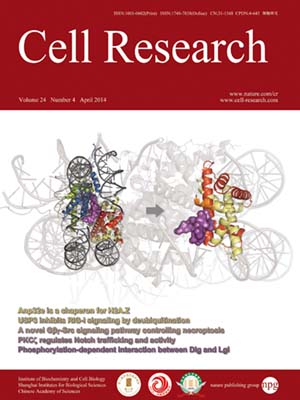
Volume 24, No 4, Apr 2014
ISSN: 1001-0602
EISSN: 1748-7838 2018
impact factor 17.848*
(Clarivate Analytics, 2019)
Volume 24 Issue 4, April 2014: 482-496
ORIGINAL ARTICLES
A small natural molecule promotes mitochondrial fusion through inhibition of the deubiquitinase USP30
Wen Yue1,2,*, Ziheng Chen1,2,*, Haiyang Liu3, Chen Yan3, Ming Chen1,2, Du Feng4, Chaojun Yan6, Hao Wu1,2, Lei Du1,2, Yueying Wang1,2, Jinhua Liu4, Xiaohu Huang5, Laixin Xia1, Lei Liu1, Xiaohui Wang1, Haijing Jin1, Jun Wang1, Zhiyin Song6, Xiaojiang Hao3 and Quan Chen1,2,4
1Laboratory of Apoptosis and Mitochondrial Biology, The State Key Laboratory of Biomembrane and Membrane Biotechnology, Institute of Zoology, Chinese Academy of Sciences, Beijing 100101, China
2University of Chinese Academy of Sciences, Beijing 100049, China
3The State Key Laboratory of Phytochemistry and Plant Resources in West China, Kunming Institute of Botany, Chinese Academy of Sciences, Kunming 650204, China
4College of Life Sciences, Nankai University, Tianjin 300071, China
5State Key Laboratory of Biomembrane and Membrane Biotechnology, Institute of Molecular Medicine, Peking-Tsinghua Center for Life Sciences, Peking University, Beijing 100871, China
6College of Life Sciences, Wuhan University, Wuhan, Hubei 430072, China
Correspondence: Quan Chen, E-mail: chenq@ioz.ac.cn;Tel: +86-010-64807322; Xiaojiang Hao,Tel: +86-0871-5219684;(haoxj@mail.kib.ac.cn)
Mitochondrial fusion is a highly coordinated process that mixes and unifies the mitochondrial compartment for normal mitochondrial functions and mitochondrial DNA inheritance. Dysregulated mitochondrial fusion causes mitochondrial fragmentation, abnormal mitochondrial physiology and inheritance, and has been causally linked with a number of neuronal diseases. Here, we identified a diterpenoid derivative 15-oxospiramilactone (S3) that potently induced mitochondrial fusion to restore the mitochondrial network and oxidative respiration in cells that are deficient in either Mfn1 or Mfn2. A mitochondria-localized deubiquitinase USP30 is a target of S3. The inhibition of USP30 by S3 leads to an increase of non-degradative ubiquitination of Mfn1/2, which enhances Mfn1 and Mfn2 activity and promotes mitochondrial fusion. Thus, through the use of an inhibitor of USP30, our study uncovers an unconventional function of non-degradative ubiquitination of Mfns in promoting mitochondrial fusion.
10.1038/cr.2014.20
FULL TEXT | PDF
Browse 2868


